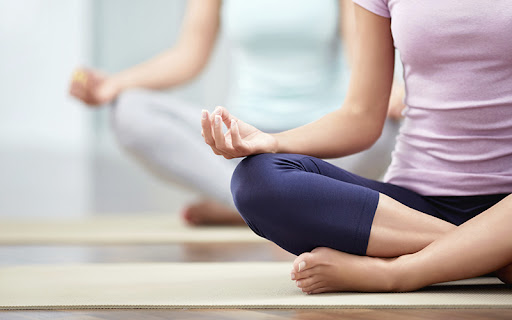In the fast-paced life of modern society, mental health issues have become an increasingly severe challenge worldwide. According to statistics from the World Health Organization (WHO), about 350 million people in the world suffer from depression, and the economic losses caused by various mental problems are as high as trillions of dollars each year. Against this background, yoga, an ancient practice with a long history and profound physical and mental wisdom, is gradually emerging and becoming an important way for people to relieve psychological pressure and improve their mental state.

1.A good way to relieve stress
In modern life, people are constantly exposed to high-intensity pressure from multiple fields such as work, family, and social life. Yoga, with its rich and diverse asanas and unique breathing exercises, provides a scientific and effective solution for reducing stress for the body and mind.
During the practice of yoga, the stretching and twisting movements brought by various asanas can accurately act on the musculoskeletal system and effectively release long-term accumulated muscle tension.
For example, the classic downward dog pose promotes blood circulation and energy flow in the body by deeply stretching the back and leg muscle groups, greatly relieving physical fatigue. At the same time, the abdominal breathing method in yoga is a powerful tool for regulating the nervous system. Through slow and deep breathing rhythm, the oxygen intake is increased, so that the oxygen supply to the brain can be improved, thereby prompting the body and mind to gradually return from a highly tense stress state to a calm and relaxed balance.
According to a study conducted by the National Institutes of Health (NIH) on 800 people who have been in a high-pressure working environment for a long time, after practicing yoga four times a week for half a year, the participants' stress hormone cortisol levels dropped by an average of 25%, fully demonstrating the excellent effect of yoga in relieving stress.
2.Assistant for emotional regulation
Negative emotions such as anxiety and depression are like a haze, often shrouding people's spiritual world, seriously affecting the quality of life and physical and mental health. Yoga has shown a unique and positive influence in the field of emotional regulation. Its internal mechanism is that yoga practice can effectively promote the secretion of key neurotransmitters such as endorphins and serotonin in the brain.
Endorphins, as natural analgesics and mood stimulants, can not only relieve physical pain, but also bring pleasure and happiness; serotonin plays a vital role in regulating emotions, sleep, appetite and many other aspects.
Individuals who often practice yoga often have a profound experience, that is, when facing the challenges and difficulties in life, they can accept and deal with them with a more calm attitude, and strong negative emotions such as anger and sadness can also be more effectively controlled and relieved.
Take the warrior pose in yoga as an example. During the practice, when the body builds a stable and powerful posture structure, the inner sense of power and self-confidence are also stimulated and awakened, thereby helping individuals overcome emotional barriers such as fear and anxiety deep in their hearts. A study published in the American Journal of Psychology pointed out that a follow-up survey of 1,000 yoga practitioners found that among those who practiced yoga for more than one year, about 70% of them said that their emotional stability had been significantly improved, and anxiety symptoms also showed a significant reduction trend, which strongly confirmed the positive value of yoga in emotional regulation.
3. Concentration and spiritual growth
Meditation practice in the yoga system is undoubtedly the core element and key path to improve individual concentration and promote deep spiritual growth.
In the practice of meditation, practitioners need to concentrate their attention and focus on a specific point, image or their own breathing. Through continuous training, they can gradually eliminate the interference of complex inner thoughts. This process has a significant effect on the training of brain concentration and can effectively improve the clarity and acuity of thinking.
Long-term meditation practice is like opening a door to explore the inner world in depth, allowing individuals to more accurately understand and understand their own thinking patterns, emotional response mechanisms and subconscious inner driving forces, and then fully tap their potential abilities and wisdom to achieve deep growth and self-transcendence at the spiritual level.
For example, in the quiet moment of meditation, as external thoughts gradually settle and inner thoughts dissipate one by one, individuals seem to be in a quiet and deep lake of the soul, which can clearly reflect their own thought ripples and emotional fluctuations, so as to accurately capture and examine the subtle changes in the heart, and use this as an opportunity to find the balance and harmony deep in the heart.
A research team at Harvard Medical School conducted a related experiment and conducted a four-month meditation training on 500 volunteers. The results showed that the participants' concentration duration was extended by an average of 35%. This data fully highlights the outstanding effectiveness of meditation practice in improving concentration.
Yoga is like an exquisite key to the soul.With its unique mind-body integration practice, it opens the sacred door to mental health and inner happiness for people. By persistently engaging in yoga practice, individuals can find the true tranquility and source of happiness in the harmony of body and mind, and then bravely face the difficulties, obstacles and uncertain challenges in the journey of life with a more positive, optimistic and tenacious healthy mentality.